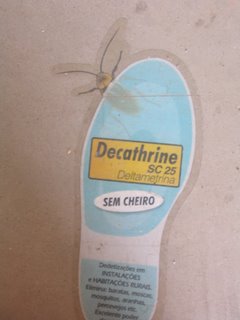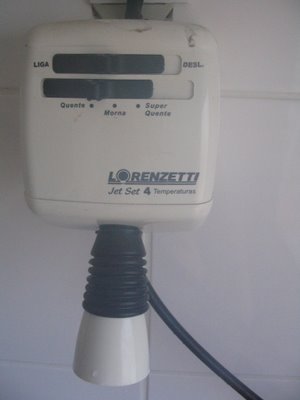Note: This is a follow-up to the Brazilian booze and work ethic entries in the guide. Like the work ethic, this was started by a lazy American spending time in Brazil, and then blown off for weeks.As
dad thinks about how to introduce
Lil' Genghis to Brazil, he's staring out a window at a lush, verdant green. Here a few Australian eucolyptus trees remain to compete against fresh plantings of native Brazilian flora. A few chickens run about; in the early mornings and at some dusks, two-foot-tall gorillas echo their huffs around the mountains.

Brazilians, far more than Americans, are in touch with nature. While Americans might freak out and buy two quarts of pesticides as soon as they spot a single intruder, Brazilians recognize that nature is close and nature makes Brazil what it is. No windows in Brazil have screens; some Windows cannot even close. The latter typically have strong but beautiful protective grates, presumably to keep out that special, gigantic breed of
insetos known as "Argentinos."

This cohabitation with nature extends beyond the merely unusual. Many Brazilians consider it a sign of good luck and future prosperity if your first-born child is carried off by
fire ants. On our next visit,
mom and
dad plan to use a Brazilian conoction known as "adhesivos" to keep
Lil' Genghis in place from

all but the "jaguarinho," which is somewhat smaller and less potentially violent than a Maine Coon Cat but much bigger than
boydog.
This communing with nature also extends into the bathroom. Some Brazilians place broad, thin boxes on their roofs, used to heat water for showers. Many Brazilian homes, on the other hand, simply offer one temperature of water from the tap.
To compensate, Brazilians jazz up their showers. Here is a sample:

Here, we see plenty of controls. Liga, or "on," makes the water pressure
tepid; desliga, or "off," makes the water pressure tepid.
Quente, or "hot," makes the water temperature tepid. Morna, whatever the hell that means, makes the water temperature tepid. Finally, for tepid water temperature, you can flip the switch over to Super Quente, or "super hot," which brings you the variety of the truly tepid.
Some residents of a suburb of a Brazilian city called
Juiz de Fora get back in touch with nature simply through the water they drink.

Here we see the wall of a cemetery, and a freely flowing pipe that offers water. From the cemetery. A sign cautions that the water should not be drunk until it's been boiled and treated with chemicals both, but the cemetery's caretaker suggests that all of that is unnecessary. In fact, many Brazilians believe the cemetery's springwater offers healthy benefits, straight from nature.
Other Brazilians -- like those who are more educated -- suspect the water offers higher levels of protein and calcium than normal springwater.



 Brazilians, far more than Americans, are in touch with nature. While Americans might freak out and buy two quarts of pesticides as soon as they spot a single intruder, Brazilians recognize that nature is close and nature makes Brazil what it is. No windows in Brazil have screens; some Windows cannot even close. The latter typically have strong but beautiful protective grates, presumably to keep out that special, gigantic breed of insetos known as "Argentinos."
Brazilians, far more than Americans, are in touch with nature. While Americans might freak out and buy two quarts of pesticides as soon as they spot a single intruder, Brazilians recognize that nature is close and nature makes Brazil what it is. No windows in Brazil have screens; some Windows cannot even close. The latter typically have strong but beautiful protective grates, presumably to keep out that special, gigantic breed of insetos known as "Argentinos."







